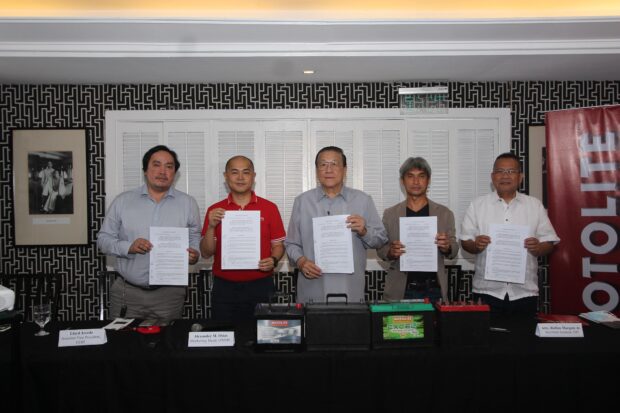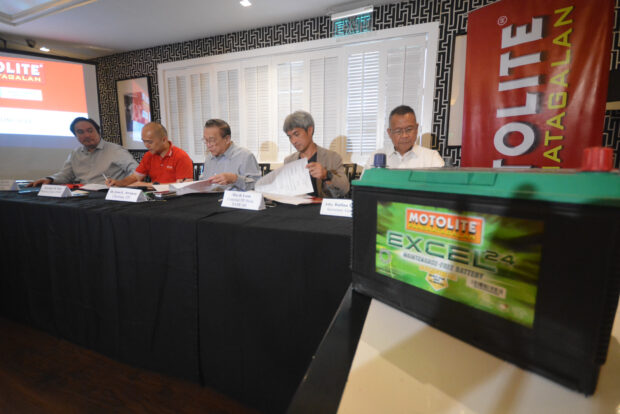Government asked to enforce ban on export of used car batteries, lead scraps
The Federation of Philippine Industries (FPI) asked the government to strictly implement the export ban on scrap lead and used lead acid batteries (ULAB) that are considered hazardous wastes.
FPI Chairman Dr. Jesus L. Arranza made the appeal during the signing of a memorandum of agreement (MOA) between FPI and Motolite that seeks to ensure the proper collection and recycling of ULABs.
Arranza said data from the Philippine Statistics Authority (PSA) showed that a sizeable amount of lead scraps have been exiting the country through official channels despite the expressed prohibition of such export under Republic Act (RA) 6969 or the “Toxic Substances and Hazardous and Nuclear Wastes Control Act of 1990” and its implementing rules outlined in Department Administrative Order (DAO) 2013-22 of the Department of Environment and Natural Resources (DENR).
The export of scrap lead, Arranza said, also goes against the Philippines’ commitment to the Basel Convention.
“As a matter of policy, export of hazardous wastes like lead scrap and ULAB is not allowed when the country of origin has the capability to recycle them. In the case of lead scrap and ULAB, we have Evergreen Environmental Resources Inc. (EERI), which operates state-of-the-art recycling facilities for ULABs in Bulacan,” Arranza said.
‘Ghost of Exporters’
Arranza said his team inquired with the DENR on the matter and was informed that the department has not issued export clearance to any company for lead scrap. The DENR stressed that there is no way the agency would approve any application for lead scrap export clearance.
“If there is no clearance from the DENR, how did these shipments manage to slip through the Bureau of Customs (BOC) and even got reflected in the PSA export data? Also, how come there is no record from the DENR and Department of Trade Industry (DTI) of who these exporters are?” Arranza asked.
Data from the PSA showed that around 8,500 tons of lead waste and scrap were exported by the Philippines from January to August last year.
Arranza said there is also no record if these exported lead scraps are in the form of ULABs or were merely separated from used auto batteries.
But since scrap lead is mostly obtained from ULABs, Arranza said this means that these illegal exporters managed to get their hands on a big volume of old batteries. Using the PSA data as basis, these illegal exporters are probably collecting around 500,000 pieces of ULAB at an average weight of 15 kgs per unit.
Dire consequences
This, Arranza noted, has dire implications economic and environmental-wise.
“We don’t know how these exporters are handling and dismantling their ULABs, which are hazardous wastes. What have they done to the plastic components and the acid, did they just throw them into the trash or bodies of water?” Arranza stressed.
Also, local recyclers like EERI and their customers are being deprived of materials to make their operations more viable.
With this, Arranza said this illegal practice should be jointly looked into by the DENR, DTI, BOC, and other concerned agencies.
Balik Baterya
Under the MOAsigned by Arranza and Oriental & Motolite Marketing Corporation (OMMC) Marketing Head Alexander M. Osias, FPI will promote the Balik Baterya Program to its members and other interested organizations, as well as sell the collected ULABs from its members and partner-organizations to OMMC for recycling based on the prevailing market buying price.
Motolite, on the other hand, will provide and/or arrange for the pick-up of ULABs from FPI and/or its donors, then promptly remit to FPI the cash value of the collected ULABs.
The company will also take care of the storage, handling, transport, and recycling of the ULAB through its accredited recycler, Evergreen Environmental Resources Inc. (EERI).
EERI operates a state-of-the-art battery-recycling facility in Sta. Maria, Bulacan. It has the capacity to recycle 10 million batteries annually and recover for reprocessing into commercial use anew around 99 percent of the components.
With EERI serving as the third-party recycler of market leader Motolite and its manufacturer Philippine Batteries Inc. (PBI), the country is assured of a sustainable source of lead-acid batteries via the so-called “urban mining”.
Arranza said Motolite and FPI, through their Balik Baterya partnership, seek to ensure used car batteries are not ending up in landfills or rivers and creeks, particularly since ULABs are considered hazardous wastes.

FPI and Motolite sign Balik Baterya Program MOA. The Federation of Philippine Industries (FPI) and Motolite, the country’s most-trusted battery brand on Wednesday signed their Balik Baterya Memorandum of Agreement that seeks to help ensure the proper collection and recycling of used lead acid batteries. The MOA was signed by FPI Chairman Dr. Jesus Arranza and Oriental & Motolite Marketing Corporation (OMMC) Marketing Head Alexander Osias. Photo shows (from left) Lloyd Arcedo, assistant vice president of Evergreen Environmental Resources Inc.; Alexander Osias, Motolite Marketing Head; Dr. Jesus Arranza, chairman of the Federation of Philippine Industries (FPI); Max de Leon, Corporate PR Head of Motolite; and Atty. Rufino Margate Jr., FPI Secretary General. FPI and Motolite committed to work together in the promotion and implementation of the Balik Baterya Program to further clean up the environment of pollution-causing ULABs while also raising funds for FPI’s projects and advocacies
“We are, thus, calling on all our members and partner-organizations to support us in this advocacy by making sure their old batteries are going to a reputable recycler like EERI. This, in itself, is already a good way to show we truly care for the environment,” Arranza emphasized.
ADVT.
